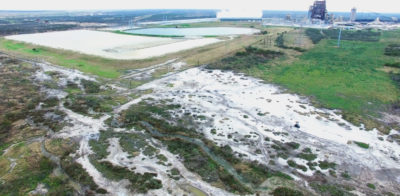Environment & Energy
Related: About this forum60 Years After Leasing Land To Coal Plant, TX Ranching Family Faces Toxic Coal Ash Impact
In 1954, the Peeler family signed an agreement to lease 6,000 acres of their 25,000-acre Texas ranch for a lignite coal mine. A few years later, they sold an additional 300 or so acres of their property to a small electric cooperative, which had taken over the mine, for the construction of a new coal-fired power plant. The family thought the arrangement would provide them with a modest income from the leases and felt they were playing a part in the electrification of rural Texas, which was then still underway.
EDIT
For years, the Peelers and the San Miguel cooperative coexisted peacefully, side-by-side. But no longer. The family and the co-op are now engaged in a bitter legal battle over the dumping of large amounts of coal ash — the toxic byproduct of burning coal — into empty mining pits and in ponds around the San Miguel plant. The soil near the various storage sites is now ashen, with silvery slicks of groundwater pooling on the surface. According to San Miguel’s own testing, pollutants from coal ash have leached into the groundwater around the power plant, with concentrations of cadmium, lithium, arsenic, and other contaminants at levels far exceeding those set by the U.S. Environmental Protection Agency (EPA).
It looks like a moonscape to me,” says Alonzo Peeler Jr., 79, whose grandfather signed the original agreement with what would later become the San Miguel co-op. The coal ash, says Peeler — a tall man with a high-pitched voice and a face that has been carved by a life spent working in the sun — “kills the vegetation, changes it, kills the grass, and blights the trees.” The Peelers say that the coal ash pollution has left portions of their ranch unsuitable for cattle grazing because the grass is unsafe to eat and the water unfit to drink. The mounds of toxic ash around the old mine are an unearthly contrast to uncontaminated sections of Peeler land, an otherwise gentle, dry landscape, where spring wildflowers create a mottled quilt of pinks, blues, and yellows.
Now the Peelers, a fifth-generation ranching family that has long been skeptical of the federal government’s reach, are looking to the EPA for help. For Alonzo Jr.’s son, Jason Peeler, who runs the family ranch, this struggle has changed his outlook on the role of government and the value of environmental regulation. “We [Texans] pride ourselves on being independent, even of our own government,” said the younger Peeler, 51. “Sitting at the ranch looking out the window at the plant, it’s hard for me believe that this [level of contamination] can happen.” The family may not find a sympathetic ear in Washington. Despite several instances in recent years of major spills at coal ash ponds, resulting in contamination of rivers and groundwater supplies, the Trump administration has been working to reverse or relax the single federal regulation governing disposal of coal ash. In one of his first moves after taking charge of the EPA in July 2018, Trump appointee Andrew Wheeler, a former lobbyist for the coal industry, sought to reverse that 2015 rule. It is one of numerous actions taken by the Trump administration that are favorable to the coal industry and electric utilities.
EDIT

EDIT
https://e360.yale.edu/features/for-a-texas-ranching-family-toxic-coal-ash-pollution-hits-home
mountain grammy
(28,804 posts)hunter
(40,473 posts)It's all roads and well sites.
Nor has agriculture and ranching been kind to the land.
I see a lot more land in need of restoration than the coal mine and power plant.
